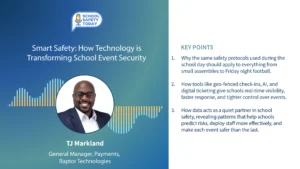More Support Needed to Protect Privacy and Advance Digital Equity
The Center for Democracy and Technology (CDT) this week released a new report — with accompanying survey findings — that reflect the urgent need to provide improved student privacy support to teachers, parents, and students. Almost half of teachers report they have received no substantive training on data privacy, and only four in 10 parents say their schools discussed their data protection practices. Despite that, parents and teachers report favorable opinions of the continued use of education technology even after the pandemic ends.
The report, titled “Protecting Students’ Privacy and Advancing Digital Equity,” is based on significant data collection and outlines steps education leaders and policymakers should take. These include prioritizing privacy-focused teacher training and proactively communicating with parents about how schools are protecting their children’s data. Additionally, leaders can reduce inequity through closing the digital divide while protecting privacy, and scale up the good practices of special educators, a standout from their peers, to protect all students. The recommendations were shaped by surveys and focus groups commissioned by CDT. View the findings here.
“It can be easy to overlook hard-to-see issues like digital safety and student privacy during a time of crisis like COVID-19,” said CDT CEO Alexandra Givens. “But as our research shows, safety and privacy are vital concerns, and the vast majority of teachers and parents support more online learning even after the pandemic. It’s critical that policymakers, schools, teachers, and parents work together to protect students.”
Building on research released by CDT last month, the new report finds that teachers as well as parents generally support the use of education technology, and three out of four say they will support an increased level of online learning at home and in the classroom even after the pandemic ends.
Students who participated in the focus groups expressed little to no previous consideration or concern about student data privacy and security, but said they trust their school to protect their information. At the same time, they reported hacked video conferences during school, and teachers exposing student grades while sharing their screens.
“The perspectives of students, parents, and teachers are chronically underrepresented in conversations about student data privacy and civil rights,” said CDT Senior Fellow of Student Privacy Elizabeth Laird. “Our research lifts up those voices so leaders can better meet people where they are, provide needed access and appropriate information, and implement student privacy protection best practices.”
Additional findings of note:
Closing the Digital Divide While Protecting Privacy
- According to surveyed teachers, schools have provided computer devices at twice the rate they did before COVID-19 — jumping from 43% to 86% — an illustration of schools’ attempts to close disparities in digital access.
- With an increase in school-issued devices comes a greater need to ensure they are not violating student privacy. The report recommends that schools minimize data collection and activity tracking while also ensuring that any data sharing complies with the law and cannot be misused to limit opportunities for students or otherwise harm them.
Building Upon Promising Student Privacy Practices
- Special education teachers lead the way in student privacy protection. The survey found that compared to other teachers, special educators are generally more familiar with, more concerned about, and receive more guidance and training on student privacy. They also discuss it more frequently with students and parents.
- A majority of special education teachers report that their school has heightened policies and procedures for the handling of special education student information and data.
The surveys and focus groups featured in the report were conducted by Edge Research in May-August 2020. The parent survey included a representative sample of more than 1,200 U.S. parents, the teacher survey included more than 1,000 K-12 educators, and eight focus groups were conducted with groups of five to six teachers or students each.









